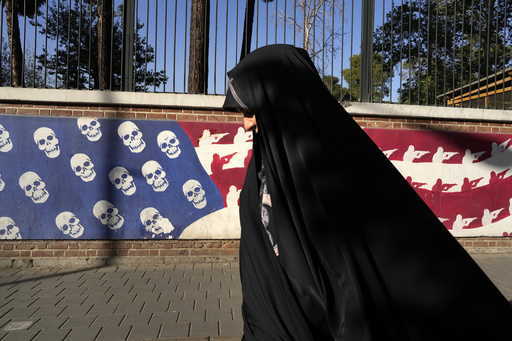
TEHRAN, Iran — As the United States nears its presidential election, Iran finds itself reflecting on the 45th anniversary of the 1979 U.S. Embassy hostage crisis. For many Iranians, the current relationship between Tehran and Washington seems fraught with tension, reminiscent of that turbulent era.
There is ongoing conflict in the Middle East, with Iran’s allies, including various militant groups, facing significant challenges as Israel intensifies its military operations in the Gaza Strip against Hamas and escalates actions in Lebanon targeting Hezbollah. Amidst this turmoil, Iran is also grappling with the fallout from recent Israeli airstrikes, which were launched in retaliation for missile attacks attributed to Iran.
The Iranian economy continues to show signs of distress, with the national currency, the rial, trading at or near historic lows against the U.S. dollar, largely due to the burden of international sanctions that stem from concerns regarding Tehran’s uranium enrichment practices, which inch closer to being weapons-grade.
In Tehran, public spaces reflect an air of defiance, especially among women who have openly challenged the compulsory hijab law, fueled by the widespread protests that erupted following the death of Mahsa Amini in 2022—a crisis that still reverberates through the country’s social fabric.
As Americans prepare to vote for either Vice President Kamala Harris or former President Donald Trump, there is a palpable sense of fatalism among some residents of Tehran about which candidate may have a more favorable attitude toward Iran.
“Every U.S. president since the revolution has held similar views about Iran, and I doubt that will change,” commented 65-year-old Sadegh Rabbani.
Both candidates have articulated hardline perspectives regarding Iran, which has sparked apprehension among many Iranians. Trump’s previous policy decisions, particularly his unilateral withdrawal from the nuclear agreement in 2018, have been perceived as leading to greater instability in the region even before recent escalations, such as the Hamas attack on Israel on October 7, 2023. Trump has previously faced threats linked to Iranian retaliation for actions like the drone strike that killed Qassem Soleimani, a prominent Iranian military figure.
Conversely, during a recent debate, Harris emphasized her commitment to supporting Israel’s defense against potential threats posed by Iran, indicating a continuation of firm U.S. policy regarding the Islamic Republic.
In terms of diplomatic efforts, the Biden administration has attempted indirect negotiations over Iran’s nuclear agenda, though these have yielded little concrete achievement aside from a recent prisoner exchange involving American citizens.
In a popular coffeeshop in downtown Tehran, where younger generations socialize, 22-year-old Zahra Rezaei expressed her hope for a Harris victory. “Trump’s approach in the past was purely anti-Iranian,” she remarked. “It’s time for a woman in leadership… I believe Harris will be more peace-oriented.”
28-year-old Ebrahim Shiri, pursuing postgraduate studies in political science, echoed her sentiments, suggesting that Harris may have a deeper understanding of global issues and asserting that her administration successfully dissuaded Israel from attacking Iranian nuclear installations, hinting at a potential shift toward peace.
Others like Mohammad Ali Raoufi,43, who runs a business dealing in double-glazed windows, suggested that Trump might have advantages in brokering swift agreements with Iran given his prior emphasis on deal-making. “The Biden administration has struggled to secure any agreements with Iran,” he noted.
Taxi driver Reza Ghaemi also posited that Trump’s presidency could reduce regional tensions, referencing Trump’s withdrawal of U.S. troops from the Middle East as a potentially stabilizing factor.
Public apprehension towards a potential U.S.-Iran war, especially under a Trump administration, was palpable among many citizens. Ahmad Moradi, 53, remarked that a Trump win would almost guarantee such a conflict. Meanwhile, a woman known only as Mahnaz, concerned about her anonymity, stated that Harris might face challenges negotiating with Iran, believing that “men can work better with men.”
“It doesn’t matter who wins,” said Fariba Oodi. “Our lives are tough regardless. But if Trump wins, it spells more difficulties, particularly for my son, who is preparing to apply to study in the U.S.”
Recently elected Iranian reformist President Masoud Pezeshkian came into office on a platform focused on alleviating sanctions, following the departure of hard-line President Ebrahim Raisi after a helicopter crash.
Despite ongoing diplomatic tensions, Iranian authorities maintain that they can separate discussions about their nuclear ambitions from the wider conflicts in the region. However, they have also faced accusations from the U.S. regarding interference in the American electoral process, which Tehran denies.
Fatemeh Mohajerani, a spokesperson for Pezeshkian’s government, expressed that Iran desires a modification in U.S. policies and advocates for respect toward the “national sovereignty of other nations,” urging the U.S. to avoid actions that escalate tensions.
Analysts predict a challenging landscape for any forthcoming U.S.-Iranina dialogue, regardless of the election outcome. Comments from analysts suggest that such discussions are likely to be contentious with limited success expected. Ultimately, the decision-making power lies with Iran’s Supreme Leader Ayatollah Ali Khamenei, who has navigated through numerous U.S. administrations.
“Khamenei has witnessed eight different American presidents,” reflected 67-year-old retired teacher Abbas Ghasemi. “He knows how to manage relations with the next one.”
